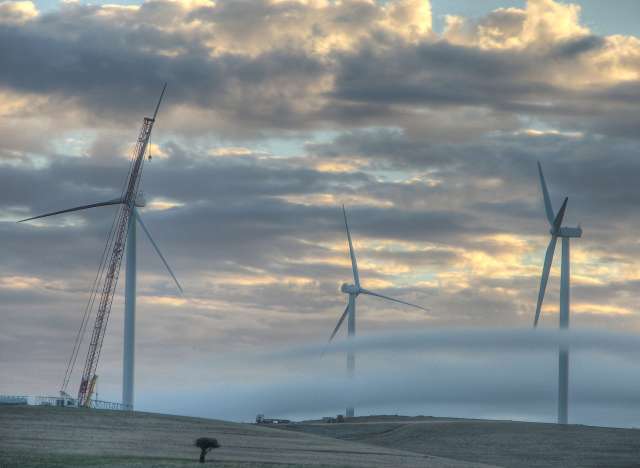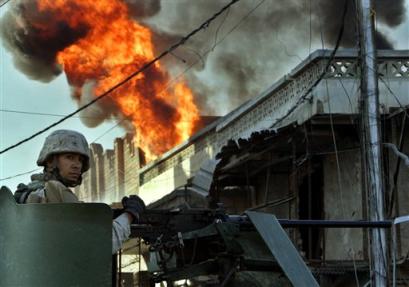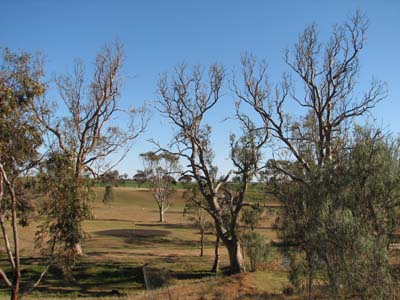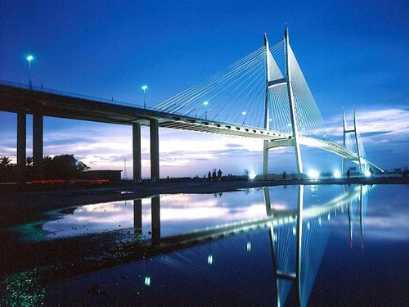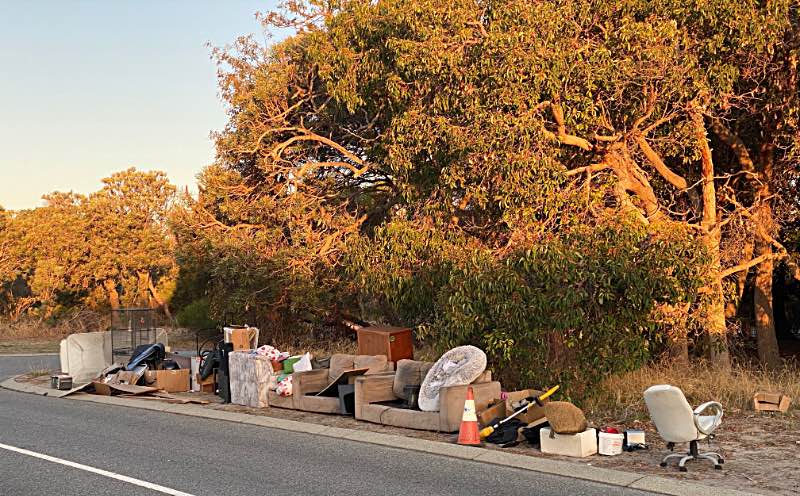|
Ashamed to be Australian?
Change Australia!
Fight for a more ethical Australia
Contact; David K. Clarke – ©
Australia ranks 53rd in the world in population, but sixth in the world in the CO2 produced by its electricity industry; it has 0.3% of the world's population, but produces 1.2% of the world's greenhouse gasses; it is well up among the worst greenhouse polluters on the planet. Australians are producing the greatest amount of greenhouse gasses, per capita, of any OECD country – even more than the people of the USA. This is not just a crime of our government, most individual Australians are similarly culpable.
Excessive and unnecessary consumption is also rampant in Australia. It too adds to greenhouse emissions.
Perhaps the greatest cause for shame is that most Australians don't seem to care much. In 2012 the Federal Labor government was doing little to reduce greenhouse gas production, while the Liberals wanted to do even less. With the despicable Abbott Government, the cause for shame was even greater.
The Liberal-National coalition was re-elected to government in 2019/05/18; apparently mainly because many Australians, particularly in Queensland, think that jobs and the money coming from the coal industry is more important than the future of the planet.
Australia's Liberal COALition government; a sufficient cause for national shameMid 2015; Abbott GovernmentLiberal Prime Minister Tony Abbott was doing his best to support the declining coal industry that is one of the main causes of climate change, ocean acidification and of millions deaths each year due to air pollution. He is also doing all he can to destroy Australia's wind power industry.Mid 2016; Turnbull GovernmentMalcolm Turnbull replaced Tony Abbott as Liberal Prime Minister. In regard to action on climate change, nothing has improved (but at least we don't have to cringe every time our PM says something in public.September 2018; Morrison GovernmentThe Turnbull government has been replaced by the Morrison government. Prime Minister Scott Morrison demonstrated his love of coal by waving a lump of it around in parliament during the Turnbull government.PM Morrison appointed Angus Taylor as Energy Minister. Mr Taylor already had a reputation for having very little respect for the truth in his apparent hatred of wind farms; certainly in his first few weeks as Energy Minister he continued with his lies and seemed to extend his hatred of wind power to all forms of renewable energy. What a low ebb Australia has sunk to! |
|
On December 18th 2009 Australia was awarded the Fossil-of-the-day award at the Copenhagen climate change conference for pressuring our Pacific neighbours for higher levels of greenhouse gasses than they felt should be aimed for. In early 2010 the Rudd Government was doing next to nothing to reduce Australia's greenhouse gas production rates and in April 2010 PM Rudd put off his proposed carbon trading scheme until at least 2013. Many parliamentarians in the federal Parliamentary Liberal and National parties are so abysmally ignorant that they believe (or at least claim to believe) that humanity has nothing to do with climate change. The excuse for not doing anything is often that we are too small to make a difference; an entirely fallacious argument.
One of the few bright points was when Julia Gillard, during her period as Prime Minister, introduced a carbon tax, which passed through Parliament in November 2011.
The evidence for the seriousness of anthropogenic climate change
has been convincing for several decades, is now irrefutable, and the body
of evidence is continuously increasing; yet the number of
Australians who believe that climate change may not be caused by humanity was
around 50% in early 2010 and was also increasing – due to a
disinformation campaign run by the big greenhouse polluters.
The Australian Greens is the only political party that has a policy that
takes climate change as seriously as the problem deserves; less than
10% of Australians vote for the Greens.
How stupid are my countrymen?
Iraq War
Perhaps the worst single act any national leader can make is to involve his/her country in an unjust and unnecessary war. Prime Minister Howard involved Australia in the Iraq war. Far worse, the Australian people voted him in as our national leader again after he had done this. It is arguable whether there was any more justification for the invasion of Iraq than there was for Nazi Germany's invasion of Czechoslovakia and Poland – the acts that started World War II.Both of the major Australian political parties seem to me to be morally empty, their interaction with the Australian people revolves around how they can win more votes and get into, or hold onto government. I doubt that the word 'ethics' would mean anything to any of their senior members. They seem to be serving only themselves, the wealthy of this country, the big corporations, and the USA.
Why do Australian governments involve our country in the 'American Way' in international relations: bombing and terrorising to try to achieve short-sighted national aims?
|
|
Why should one be ashamed of being Australian?
|
- Australia is one of the greatest per-capita greenhouse polluter on Earth and there is ample evidence that man-induced greenhouse is the gravest long-term danger to the Earth. Australians are looking after their own short-term future at the expense of the long-term future of the planet. The Rudd Government promised to do better, but did little; the Gillard Government has not done a lot more. Compare Disasters provides a perspective on the probably magnitude of the climate change disaster compared to such others as bird flu and terrorism.
- After agreeing to the Kyoto Protocol, following being given very favourable terms, Australia refused to ratify the Protocol.
- Australia changed its relationship with the World Court of Justice to stop East Timor from obtaining its rights over the Timor Sea oil and gas fields.
- The Australian government has largely ignored human rights abuses in Indonesia; of especial significance being our near neighbour, the Indonesian province of West Irian (West New Guinea).
- The gap between rich and poor in Australia is huge and growing. With many other Western nations, we have allowed greedy company executives to funnel disproportionately large proportions of company profits into there own pockets, to the detriment of all others involved. They avoid paying taxes while the less well-off have to make up the short-fall.
- Prime Minister John Howard has made Australia into the unquestioning assistant to the USA in all that nation's moves toward global dominance. The Rudd, Gillard and Abbott governments have shown no willingness to stop this subservience to the USA.
- The invasion of Iraq (Arundhati Roy has called this the most immoral war in history):
- Estimates of the number of Iraqi civilians to have been killed in the war range up to 600 000;
- The invasion was not invited by the Iraqi people;
- There was no UN sanction of the invasion;
- Iraq posed no danger to Australia (or to the USA);
- The Weapons of Mass Destruction that supposedly justified the war were not there;
- There was minimal or no evidence that Iraq was involved in terrorist attacks against the USA or Australia;
- The US has sold off many Iraqi assets to pay for the 'liberation';
- The invasion forces did not protect Iraqi cultural assets, looting was rampant; they even allowed several hundred tonnes of high explosives to be stolen;
- For all the damage and loss of life, it remains to be seen if the Iraqi people are better off than before the invasion. I strongly suspect that this is a question that very few in possitions of power in Australia, the UK or the USA would want answered.
- Even after Australia's criminal involvement in the Iraq war and knowing the Howard Govenment's terrible record on climate change, the Australian people voted the Howard Government in for another term – showing that they were no better than their government.
- In December 2005 the Australian Parliament voted in a draconian 'anti-terrorism' bill that will have very little, if any, effect on reducing terrorism, but which will erode the rights and freedoms of Australian people. This was a betrayal of those who fought and died for freedom in WW2. I believe that Liberal, Labor and National parties all supported this legislation while it was opposed by the Australian Democrats and the Greens. The Australian people reacted to this betrayal with their accustomed apathy.
Australia's greenhouse emissions
|
The Climate Change Performance Index: Results 2015
|
|---|
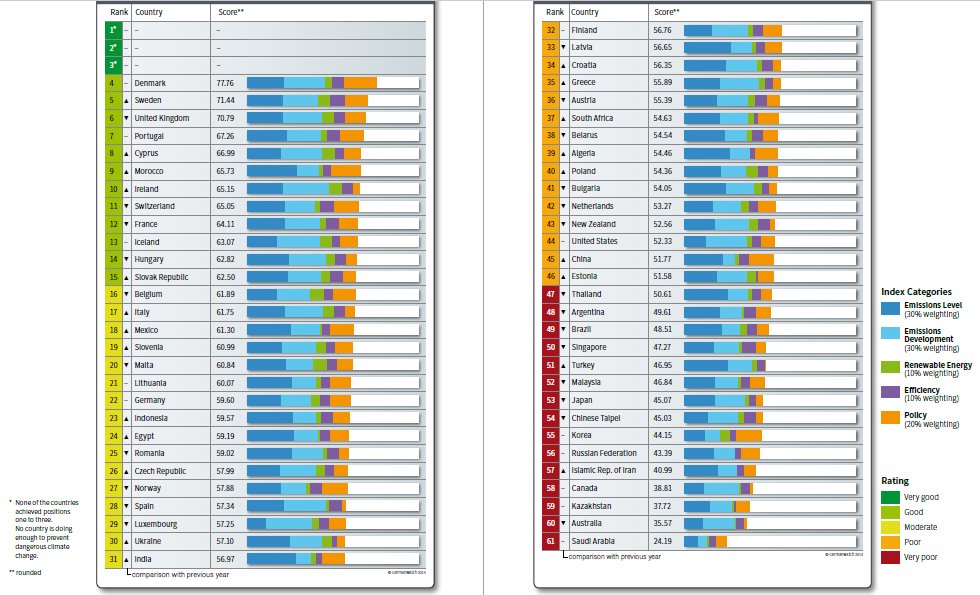
|
Image source: German Watch: The Climate Change Performance Index: Results 2015 Note Australia's position; second last of 61 nations. |
In the above report, the comment about Australia in the Climate Policy section is:
"Since joining the "very poor" group last year, Australia has lost even more ground and now comes in last together with Canada and Turkey."
For more see Failings of Australian Governments.
A very informative article on the Iraq War of 2003 is given in Wikipedia.
|
|
Australians and climate change
|
The photo below shows red stringybark trees in
Spring Gully Conservation Park
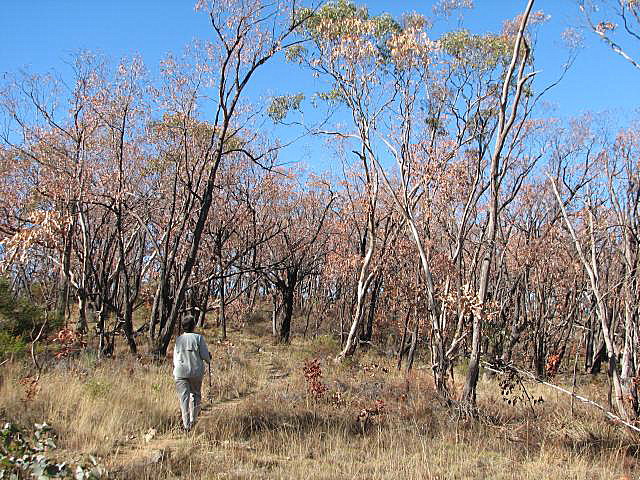
|
Considering the local environmental impacts such as those shown in the two photos above and all the publicity that climate change (and ocean acidification) has had, nobody who is reasonably intelligent and reasonably well informed could not know that climate change is a fact, is due to Man's activities. One of the main causes of both is the emissions from motor vehicles.
One way we can all reduce our climate change impact is by minimising our driving and by driving a car that is no bigger than we need.
On 2006/03/18 I took a folding chair down to the main road (Clare to Blyth)
in front of my place for an hour and ten minutes to get a record of the
traffic going past. I should say that it was a Saturday and the day of a
state election – this would have had some effect on the mix of traffic.
I have tabled a summary of the traffic below.
| Number of occupants | |||||
|---|---|---|---|---|---|
| Type of car | 1 | 2 | 3 | >3 | Total |
| Small car | 3 | 0 | 0 | 0 | 3 |
| Medium car | 10 | 5 | 0 | 0 | 15 |
| Large car | 46 | 23 | 2 | 1 | 72 |
| Large 4WD | 12 | 5 | 0 | 0 | 17 |
| Large car with caravan | 0 | 2 | 0 | 0 | 2 |
| Large 4WD with caravan | 0 | 1 | 0 | 0 | 1 |
| Totals | 71 | 36 | 2 | 1 | 110 |
Notes on the tableMy estimates of car sizes go something like this: small, <1 tonne; medium, 1-1¼ t; large 1½ t; large 4WD, 2 t.I did not record large commercial vehicles. Some of the large 'cars' were utilities (pick up trucks) that had at least a partial load. There were no pedestrians, bicycles, or motorbikes. There were no busses (there are four busses a week available to pick up passenges going past my property). 4WD = four-wheel-drive = SUV |
All the cars I saw, other than the utilities, could have taken at least four people, some could have taken eight. Apart from one or two of the utes, not one of the total 110 had a full load of passengers; 65% of the cars I saw contained only the driver. Not counting the towing vehicles, about 160 tonnes of vehicles went past carrying about 147 people; if the average weight of an occupant was 70kg that is 160 tonnes of vehicles carrying 10 tonnes of people (a payload ratio of only 0.0625).
If the people I recorded cared about how much greenhouse carbon dioxide they were releasing into the atmosphere why did 72 drive large cars and only three drive small cars? (Few of these people could claim to not know about the greenhouse/climate change problem. It had been well publicised for years. They would also have to know that vehicle emissions increase with vehicle size.) (See Eat half the cake.) Why were there no pedestrians or cyclists? (Clare is 5km away from where I did this survey; I frequently ride a bike, and sometimes walk, into town.)
This is another reason that I am ashamed to be Australian. On the other hand, I have no reason to believe that Australians are more selfish than are non Australians. Probably most people would behave in the same way if placed in the same situation. Perhaps I should say that I am ashamed to be a member of the human race?
The majority of Australians are well-intentioned, but they fail to look at the bigger picture, they don't see themselves as citizens of the world, with the responsibilities that go with that citizenship. In this way they are no different to those who have large families (often for religious reasons) in our overpopulated world, when they could choose family planning.
Can Tony Abbott be blamed for his irresponsible stand on greenhouse emissions when the common people are unwilling to modify their behaviours?
Of course this is not the only evidence that Australians give a very low priority to the environment. A low percentage of Australians vote for political parties that are strong on environment, and the major parties have found that they will get more votes by promising tax cuts or pay rises rather than by promising to do more for the environment.
